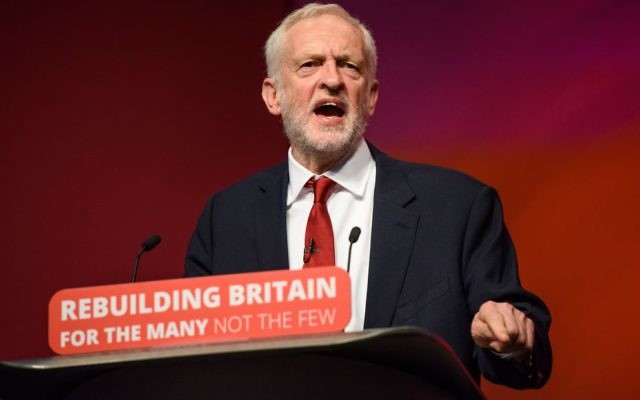Corbyn pledges to recognise Palestinian state
JEREMY Corbyn, the head of Britain's Labour Party, said that he would immediately recognise a Palestinian state if elected to lead the United Kingdom.

JEREMY Corbyn, the head of Britain’s Labour Party, said that he would immediately recognise a Palestinian state if elected to lead the United Kingdom.
In his keynote speech to the fourth day of the party’s annual conference last Wednesday in Liverpool, Corbyn criticised Israel’s “ongoing denial of justice and rights to the Palestinian people” and what he called its “discriminatory nation-state law”, before affirming that he is for a two-state solution to the conflict.
“And in order to help make that two-state settlement a reality we will recognise a Palestinian state as soon as we take office,” Corbyn said to loud applause, according to The Times of Israel.
Corbyn also discussed the accusations of antisemitism against him and others in the party that have reached a high point in recent months.
“The Jewish people have suffered a long and terrible history of persecution and genocide,” he said. “The row over antisemitism has caused immense hurt and anxiety in the Jewish community and great dismay in the Labour Party. But I hope we can work together to draw a line under it.”
Earlier in the conference, the party passed a motion criticising Israel and backing a freeze on British arms sales to Israel.
The party criticised Israel’s use of force against Palestinian protesters on the border with Gaza and called for more British government funding for the United Nations agency for Palestinian refugees.
Before and during the votes on the motion, some delegates waved Palestinian flags and chanted “Free Palestine”.
Labour’s foreign affairs spokeswoman Emily Thornberry warned onstage at the conference that the party must kick out “sickening individuals on the fringes of our movement, who use our legitimate support for Palestine as a cloak and a cover for their despicable hatred of Jewish people, and their desire to see Israel destroyed”.
The party’s National Executive Committee last month approved the full International Holocaust Remembrance Alliance, or IHRA, definition of antisemitism and all its examples, as well as an additional clause on Israel, allowing “freedom of expression” in criticising it.
In July, the party had come under fire after its ruling body and leadership endorsed a code of conduct that excluded several of the IHRA examples of antisemitism, including accusing Jews of “being more loyal to Israel” than their own country; claiming that Israel’s existence is a “racist endeavour”; applying a “double standard” on Israel; and comparing “contemporary Israeli policy” to that of the Nazis. Party members apparently felt such definitions would chill criticism of Israel.
Labour under Corbyn, a hard-left politician who has called Hezbollah and Hamas his “friends” and is fighting accusations of harbouring antisemitic sentiments, has come under intense scrutiny in the media over antisemitic rhetoric by party members. In 2016, an inter-parliamentary committee accused Labour of creating a “safe space for those with vile attitudes towards Jewish people”.
In an interview with BBC host Andrew Marr ahead of the Labour conference, Corbyn declined to personally apologise for a series of antisemitic incidents within the party.
“I’ll simply say this, I am an anti-racist and I’ll die an anti-racist. Antisemitism is a scourge in any society. I have opposed it all my life and I will continue to oppose it all my life,” Corbyn said.
Corbyn also told Marr that remarks about him made last month by former British Chief Rabbi Lord Jonathan Sacks were “quite hurtful and quite offensive” and “beyond offensive”.
Sacks had labelled Corbyn an “antisemite” and called his rhetoric “dangerous”. He compared Corbyn’s speech from 2013 in which he said that “Zionists” were unable to understand British ways of thinking despite growing up in the country to the anti-immigration “Rivers of Blood” speech made in 1968 by Conservative British lawmaker Enoch Powell.
Rabbi Sacks told Marr last month that “when people hear the kind of language that has been coming out of Labour, that’s been brought to the surface among Jeremy Corbyn’s earlier speeches, they cannot but feel an existential threat”.
“Anyone who befriends Hamas and Hezbollah, anyone who uses the term ‘Zionist’ loosely without great care, is in danger of engulfing Britain in the kind of flames of hatred that have reappeared throughout Europe and is massively irresponsible,” he said of Corbyn.
JTA

comments